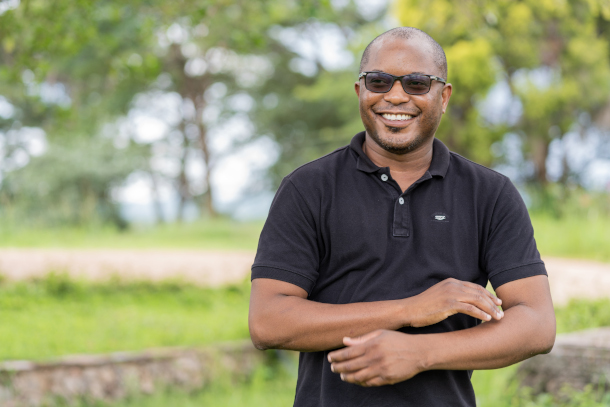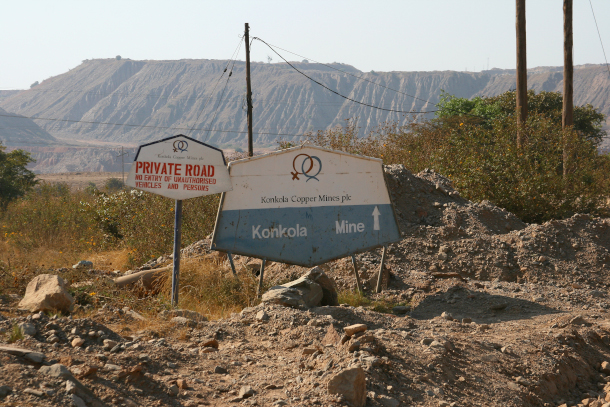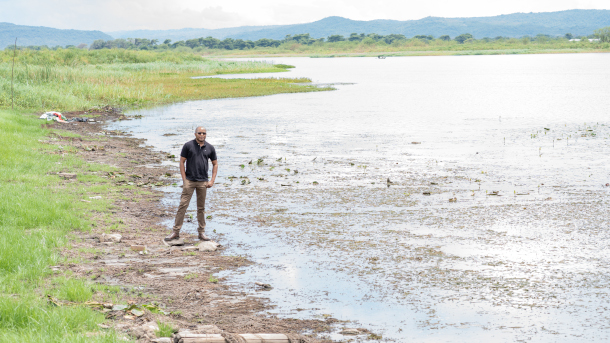UK Courts Force A Zambian Copper Mine Cleanup
Air Date: Week of April 28, 2023

Chilekwa Mumba was recently awarded the prestigious Goldman Environmental Prize for coordinating the precedent-setting international lawsuit which held UK mining company Vedanta Resources responsible. (Photo: Goldman Environmental Foundation)
The 2023 Africa recipient of the Goldman Environmental Prize brought a UK based mining company to justice for polluting a river in Zambia with waste from an open pit copper mine that sickened locals and killed fish. Prize winner Chilekwa Mumba joins Host Paloma Beltran to share how he organized the community and persuaded a UK based law firm to take on the case.
Transcript
BELTRAN: The Goldman Environmental Prize annually awards 200,000 dollars to one environmental activist from each inhabited continent. Over the next few weeks we’ll share some of their stories with you starting this week with Chilekwa Mumba of Zambia. Mr. Mumba won the 2023 Goldman Prize for Africa for his work to stop the UK based mining company, Vedanta Resources, from polluting a local river. Mining is a big business in Zambia, roughly three quarters of the country’s exports are from mining. And the largest single employer in the country is the Konkola Copper Mines, which operates the second largest open pit mine in the world at 7 miles long. After mining began there the nearby Kafue River became so polluted, fish washed up on the banks of the river and the water turned bright blue from copper, sulfate and acid pollution. Local people became sick and could no longer fish. So, Chilekwa Mumba, who grew up in the area, began to organize local communities to fight back and secured an international law firm to take up the case, which won the right to sue the mining operation’s holding company in the UK. That ruling prompted the holding company to settle for an undisclosed amount, likely some place in the millions of dollars. The government of Zambia also replaced the mining company’s operators with new ones who have reportedly halted toxic spills and discharges. Chilekwa Mumba joins me now for more, welcome to Living on Earth!
MUMBA: Thanks very much for having me Paloma.
BELTRAN: What prompted you to organize a lawsuit against Konkola copper mines parent company Vedanta Resources.
MUMBA: Basically, there were incidents of pollution as the claimant stated. And even if the Zambian courts were involved in the process, nothing was really concluded reasonably with the claimants being the people who are being affected. So looking at that situation, and myself, being a resident of Chingola from the time I was young , though, so remembering how things were back then there was a specific point we used to go to to fish, and fish was no longer there. So it had this impact on my childhood memories. And from then on, I thought they should be something which should be done.

Alarmed by the pollution produced by the Konkola Copper Mines operation in Zambia, Chilekwa Mumba won a lawsuit in the UK that held the mine’s parent company, Vedanta Resources, responsible. (Photo: Goldman Environmental Foundation)
BELTRAN: How did the contamination of the Kafue River affect locals in Zambia? What is the importance of the Kafue River?
MUMBA: The Kafue River is the main water supply for farmers and residents not just in Chingola, but it flows all the way to the southern part of Zambia. So it is of great significance. And one of in fact, the tourist attractions, which we have in our country. So whenever those spillages would occur, would read in the media about how fish are just found floating. And obviously, there was some environmental degradation going on, as a result of the mining activities. As we found there were times when the acid levels of water was so high. So there were very specific complaints about stomach issues from children, children just really wander around the villages. And if they are thirsty, they don't think about what's happening, they'll just get a cup and take their drink of water from the river. That's how they live. So they'll usually get diseases. It's hard to quantify, but clearly the impact was there.
BELTRAN: In 2015, you convinced Leigh Day, a UK based law firm to visit and ultimately take on a lawsuit to hold on to legally accountable in the United Kingdom? How did you persuade this law firm to do this?
MUMBA: First of all, I was grasping for straws in the wind, I was just saying something has to be done about this. So I wrote to various law firms around that time. But it's important to state that I had already done an investigation and gathered whatever information I had. And I'll pass it on to the various law firms, maybe even close to 100 law firms, global law firms had written to and Leigh Day they just promptly replied, I think and they said, We're going to come over there in two weeks. And that's how the whole journey started.
BELTRAN: Wow. And what are some of the challenges you faced?
MUMBA: Well, one of the biggest challenges, just even professionally, was getting the community to believe that something could be done about the issue, you have to understand that the community is a typical village. And I'm afraid to say they do not have the best of education standards, which are required for somebody to realize their rights. So getting them to understand that it is possible to stand up for yourselves in using legal means it was a bit challenging, because they will they were like we've been complaining for years, nothing's ever happened even in our own courts. The case never reached a reasonable conclusion. But I found that we could get around that by myself spending more time in the community and building trust with the community and keeping them motivated to make sure that the whole case took off and keeping them United until we reached the conclusion.
BELTRAN: That was a huge endeavor. Because when you were building the case, you had to convince villagers to provide blood samples for analysis of the health impacts to look at the contamination in their body. And I believe we're talking about 1000s of blood samples.
MUMBA: Correct?
BELTRAN: How did you gain the trust of locals during this long process?
MUMBA: I spent a lot of time there. I was basically there. Every day, I would spend about three weeks a month there. At this point, my family was in Lusaka, but I had to kind of shift and be there for quite some time. In a typical village setting, you're prone to so many rumors, this and that. So it's very important that you maintain that face time with them and clarify rumors which come flying, left, right and center.
BELTRAN: What's the distance from the Capitol to where you had to travel and talk to the community that was involved in this lawsuit?
MUMBA: About 450 kilometers, and that takes about seven hours. It's a seven hour drive.
BELTRAN: That's a long drive.
MUMBA: Absolutely. Yeah.
BELTRAN: In 2017, you and a lawyer with Leigh Day were arrested at a public gathering while speaking with villagers about the lawsuit. Can you please tell us what happened that day? And what sort of harassment did you receive during the legal process?
MUMBA: Well, basically on that particular day, as you were saying, we were talking to a community and trying to get witness testimonies and so on and so forth. It was just basically part of our investigation process. And the police did come. And they used a certain law, I always refer to it as an archaic law where they say that you are supposed to notify them if you're in a gathering of more than 10 people, also. So now that law is not really applied all the time, it's just a matter of convenience when they feel like they need to, perhaps say harass someone, they'll effected, they came through and just picked us up saying we need to clarify some issues with you and picked us up and throw us into the police cells kept us there for some time, and eventually, it's a misdemeanor. So we were released by the end of the day.
BELTRAN: And in April of 2019, the UK Supreme Court found that Vedanta as a parent company of KCM, owed villagers near the mine a duty of care. And Vedanta could be held accountable in UK court for environmental damage from the in Konkola copper mines, operations, what was running through your head during the ruling?
MUMBA: I don't know how to really put that in words, it was a wonderful feeling for, for myself, the whole team, the lead a team, I don't know how to describe it's really.
BELTRAN: What was the local reaction to this victory?
MUMBA: It was, I mean, people are so happy, and not just those who are involved in the case itself. But just communities across the copper build, where there's a lot of mining, they have seen a form of protection for them, and the way mining operations do their industries and whatnot. It made them more aware of certain legal channels to pursue when something is wrong in the community.

In 2021, Vedanta settled with nearly 2,000 people from the four villages near KCM; villagers received undisclosed financial compensation from Vedanta for the pollution that devastated their lives and environment. (Photo: Goldman Environmental Foundation)
BELTRAN: So what was the level of cooperation of the Vedanta copper mines through this process? What was their reaction after the case?
MUMBA: Well, they decided that they will be doing things in a much better way in terms of community care, and the environment. It is of great note that they found me to be a community interface, and have actually asked me to speak on behalf of the community on the issues around mining. And Vedanta has been quite responsive. They've been providing safe and clean water to different communities around mines. And interestingly, not just that particular mine, but other mines as well. They've responded quite well, they've been more responsive than ever.
BELTRAN: You were recently awarded the Goldman Environmental prize for your hard work and for this case, what does this award mean to you?
MUMBA: It has basically inspired me to do more for our communities. The first motivation for me was when I was a kid, I used to come here to fish, then that was the best thing to do playing outdoors. And then to find that situation. I have kids now and they've never experienced such fun is my opinion. It awoke something not just in my conscious, but just my whole being that perhaps we can take little steps and see how far they go.
BELTRAN: Chilekwa Mumba is a 2023 Goldman Prize recipient from Africa. Congratulations, and thank you so much for joining us.
MUMBA: Thank you
BELTRAN: And, Steve, I want to share one more thing about this case with you.
CURWOOD: Sure, what’s that?
BELTRAN: So, this case set a really important precedent in the UK. If you remember the Konkola Copper Mines is a subsidiary of the parent company Vedanta Resources.
CURWOOD: Yeah that’s right.
BELTRAN: So, this case is the first time that the UK Supreme Court has held a British parent company liable for the environmental damage caused by a subsidiary in a foreign country. And now the precedent has been set for more than 40,000 people in the Niger Delta who have sued for damages from oil spills that have contaminated their land and waters for years.
CURWOOD: And let me guess, they are suing the parent company of a local oil one.
BELTRAN: That’s right they are suing Shell Global, one of the biggest oil companies in the world and the UK Supreme Court gave them the green light to move forward with that case based on the outcome of Chilekwa Mumba’s work in Zambia.
CURWOOD: Well, oil drilling is a huge business in the Niger Delta, we’ll have to keep an eye on that case.
BELTRAN: Yes, indeed.
Links
The Goldman Environmental Prize
BBC News | “Vedanta Mine Settles Zambian Villagers' Pollution Claim”
Living on Earth wants to hear from you!
Living on Earth
62 Calef Highway, Suite 212
Lee, NH 03861
Telephone: 617-287-4121
E-mail: comments@loe.org
Newsletter [Click here]
Donate to Living on Earth!
Living on Earth is an independent media program and relies entirely on contributions from listeners and institutions supporting public service. Please donate now to preserve an independent environmental voice.
NewsletterLiving on Earth offers a weekly delivery of the show's rundown to your mailbox. Sign up for our newsletter today!
 Sailors For The Sea: Be the change you want to sea.
Sailors For The Sea: Be the change you want to sea.
 The Grantham Foundation for the Protection of the Environment: Committed to protecting and improving the health of the global environment.
The Grantham Foundation for the Protection of the Environment: Committed to protecting and improving the health of the global environment.
 Contribute to Living on Earth and receive, as our gift to you, an archival print of one of Mark Seth Lender's extraordinary wildlife photographs. Follow the link to see Mark's current collection of photographs.
Contribute to Living on Earth and receive, as our gift to you, an archival print of one of Mark Seth Lender's extraordinary wildlife photographs. Follow the link to see Mark's current collection of photographs.
 Buy a signed copy of Mark Seth Lender's book Smeagull the Seagull & support Living on Earth
Buy a signed copy of Mark Seth Lender's book Smeagull the Seagull & support Living on Earth

